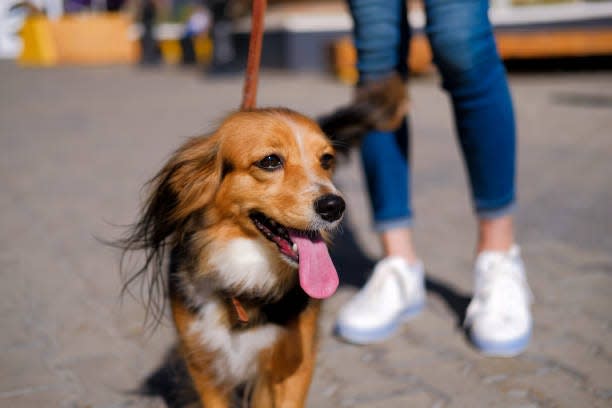ALL ABOUT DOGS: Patience prevails in early phases of leash training

Question: We have a 12-week-old puppy, and we’ve started to acquaint him with his leash, but it’s not going that smoothly. He grabs it, won’t come along with us sometimes, and is generally uncooperative. How do I get on the right track with him?
Answer: Right now your puppy doesn’t fully understand the leash because he’s a baby, so it’s important to employ your most valuable tool in this endeavor: Patience.

In spite of my "brilliant skill and acumen" in this area, I can tell you when my dog was a little puppy two years ago, she was very challenging to leash train. But I patiently hung in there, reminding myself this part was temporary because I also understood there is a very powerful and important message communicated with the leash. The morning after I brought her home, she was on the sidewalk with me on a leash. Not to teach her anything fancy, but just to get her acquainted with the notion this was going to be a daily venture.
Remember, for you it's a walk, but for your little "urban wolf," he's on patrol in his territory with his leader. Dogs need a walk primarily because exercise calms them down, but also because of the message it sends about pack hierarchy. Dogs inherently understand whoever leads on the leash is the leader. But your little puppy just got to the planet, so it's up to you to re-stimulate his subconscious awareness of what the leash routine means.
It's important not to create a "bad leash experience" behind potential frustration and impatience. We want him to love the leash not hate it. That doesn't mean we can't use the leash to calmly cajole him into coming along with us, though.
In spite of all the suggestions you'll get from well-meaning friends, the only tools you need now are a 6-foot flat leash and a basic flat collar. Retractable leashes are fine for potty breaks out in the yard, but absolutely not for leash training.
When you take your puppy out, give him a minute to sniff around in the yard. Hopefully he'll pee or maybe even poop, giving you an opportunity to reward him, reinforcing his potty training. Puppies have a natural tendency to follow us, so we can use this inclination to help with puppy leash work. See if you can coax him to follow you out to the sidewalk or the street. Many times, excitedly patting your leg and saying "c'mon!" is enough to encourage your puppy to follow you, which in the beginning is all you want.
Note: To dissuade him from grabbing the leash, simply jerk it out of his mouth as you say "no!" Don't worry, you're not going to hurt him. But it's not pleasant. If you stick to your guns on this, yanking it out of his mouth every time, it won't be long before he figures out grabbing the leash with his mouth isn't a good idea.
He may follow you out to the sidewalk, but once you get there, just stop, implying he doesn't want to continue. If he won't follow you out to the sidewalk, pick him up and take him. Remember, to some puppies, the world outside your home is overwhelming. Yes we want our puppy to walk with us on the leash, but acclimating him to the world is a process we facilitate with our patience. We make this happen with patient perseverance.
When he starts to follow you, tell him "good!" If he stops, stop with him, six feet ahead on the leash. Usually at this juncture puppies are thinking, "wait a second, I don't know about this." Let him have his moment. He's taking it all in, trying to wrap his mind around being out in the world. Give him a slight bump on the leash excitedly saying "c'mon!" Don't drag him.
The bump on the leash replicates his mommy bumping him with her nose. It's important to be patient and calm, but also persistent. His mommy would insist that he follow her. More on this next week.
Originally from Louisiana, Gregg Flowers is a local dog trainer who “teaches dogs and trains people.” Contact him at dogteacher7@aol.com or dogsbestfriendflorida.com.
This article originally appeared on Sarasota Herald-Tribune: GREGG FLOWERS: Patience prevails in early phases of leash training

